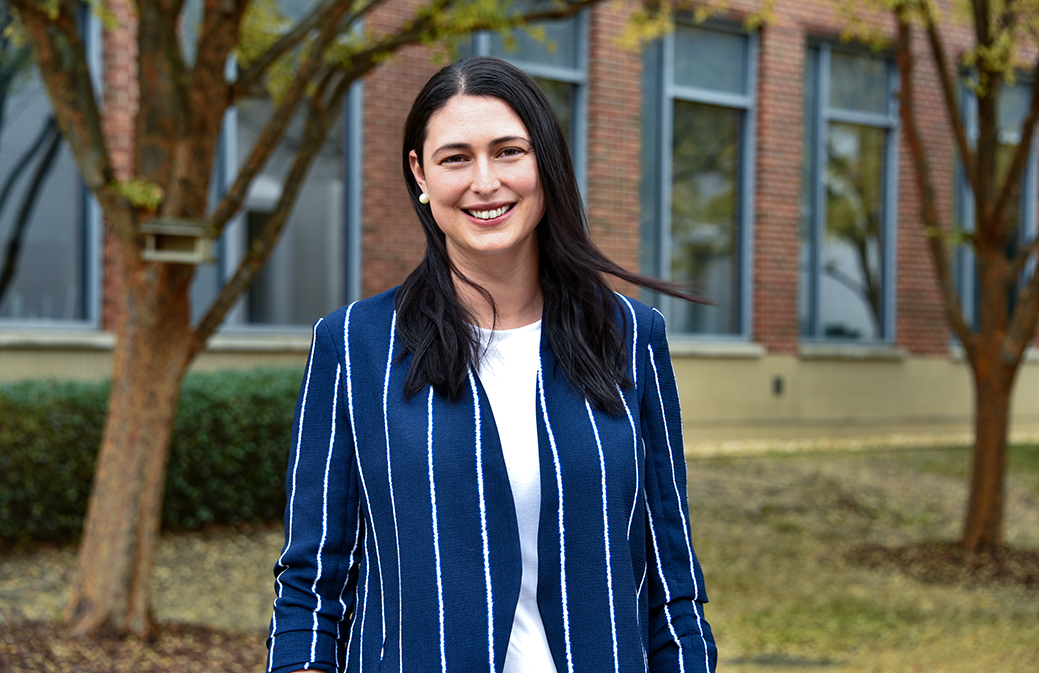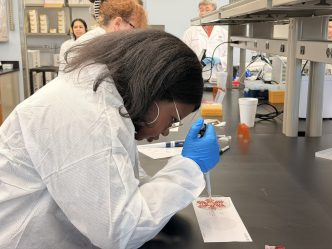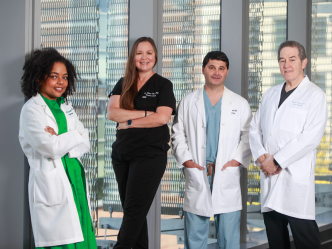The Georgia Cancer Center’s Outpatient Services clinic opened in 2010 and provides a multitude of services for its patients, now including a Speech Therapy Program that was initiated this summer.
Speech therapy covers nine areas of medical intervention, many of which cancer patients might benefit from, according to Sarah Smith, MCD, CCC-SLP, a speech pathologist at the Georgia Cancer Center.
“We help to rehabilitate swallowing, voice and speech problems resulting from cancer treatment and changes in cognition and language associated with chemotherapy,” said Smith, who joined Augusta University Medical Center in January 2019 and the cancer center this July. “Additionally, we can help with structural issues resulting from surgery or radiation, such as trismus (narrowed mouth opening), and total laryngectomy by using voice prostheses to restore voicing.”
The speech therapy team also work with other caregivers to treat patients.
“Another common benefit to patients is working with speech therapists in conjunction with nutritionists to keep weight on during treatment, especially when the patient’s mouth is full of sores or thrush,” Smith said. “The great thing about speech is we really focus on restoring quality of life in a very intimate way (the ability to communicate and share thoughts) after and during cancer treatment. Therapy may be preventative or we may be consulted on an intervention basis.”
Smith said the concept for putting speech into the GCC has been in the making for years. Currently, it is the only speech therapy program in the Augusta area that was designed specifically to assist cancer patients.
“Speech has been involved in the ENT tumor board since its initiation … speech has to be involved in the meeting for it to be a certified board,” Smith said. “In a medical system this large, there are a lot of logistics to consider in a move this big. I am thankful for the work that some of my managers and predecessors did for me in helping make this a reality. I was a very small piece in making this happen.”
The Georgia Cancer Center has three outpatient speech therapists – Smith, who treats oncological and neurological conditions related to speech; Stephanie Reyes, who works in MOB 1 and treats voice and swallowing disorders for ENT; and Caroline Hamilton, who works at AU Care Center West Wheeler with neurological rehabilitation.
James Thomas Jr. sought treatment at the GCC for laryngeal cancer, and now uses a voice prosthesis as a byproduct of surgery after they removed his voice box, thyroid and all lymph nodes.
“Right after surgery, Sarah was there to help us learn to communicate,” said Paula Thomas, his wife. “She taught him how to open his mouth to talk so I could read lips better.”
The Thomases were not aware beforehand that the cancer center had a Speech Therapy Program, but they said the experience so far has exceptional.
“It’s been great … Sarah especially,” Paula said. “(The program) offers a lot of help and support through the transition to becoming a neck breather. For James and myself, it has been a pleasant experience.”
Leonard Schaeffer had cancer of the oral cavity and underwent surgery. He received radiation therapy and chemotherapy before he contacted the Speech Therapy Program at the conclusion of his treatment.
“The surgery and treatment left me with limited range of motion in my mouth. Speaking was difficult and I was only able to eat liquid and soft foods,” Schaeffer said. “During my initial consultation with the Speech Therapy Program, I was given nutritional advice and exercises to increase the motion in my tongue, lips and jaw. I am now able to speak more clearly and eat just about any type of food. I am well pleased with the progress.”
Smith said the GCC is striving to provide comprehensive and interdisciplinary care for its patients, considering the cancer itself or its treatment can create systemic changes. She said patients have responded “very well to speech in the GCC” considering the changes they deal with from prognosis to treatment to recovery.
“These changes can negatively impact the swallowing/eating, communication and problem solving of an individual. The therapeutic needs of a cancer patient are different than someone who has suffered another condition, such as stroke, and it’s important to have a therapist who understands these unique needs in order to best individualize a plan of care,” Smith said.
“Most patients who experience changes to their communication and swallowing find these changes scary, and a good portion of them are afraid to talk in depth to their doctor about them. Many patients think they are experiencing these symptoms alone. The reality, however, is that often these changes are expected outcomes of cancer treatment, will subside or are easily treatable.”
Smith said her patients appreciate the time they spend together and leave feeling more hopeful and educated. They leave knowing someone understands their unique needs and is there to provide quality therapy.
Having the support from Smith and the program has helped Schaeffer and the Thomas family deal with their current situations.
“Being able to speak better has improved my confidence and self-esteem,” Schaeffer said. “Being able to eat what I want has improved my overall physical health. Sarah is very understanding and helpful. She wants her patients to achieve their goals and improve their quality of life. Give the folks at the Speech Therapy Program a chance to help you. I think you will reap the benefits like I have.”
James Thomas echoes those sentiments.
“It helped me learn that I can still live a good life,” he said. “They gave me plenty of support resources for depression, confidence, etc. Always asking me if I’m OK and not sad or anything.
“The people working with me have been amazing, understanding and caring. I wouldn’t go anywhere else for treatment. I travel an hour and a half one way, and would go further if I had to.”
 Augusta University
Augusta University




